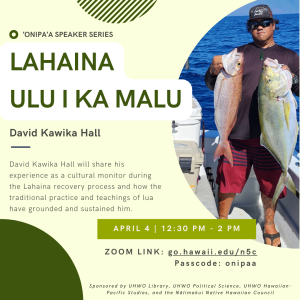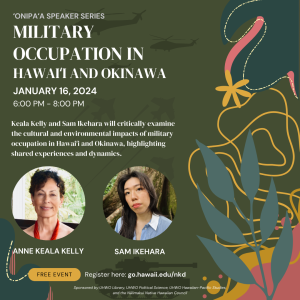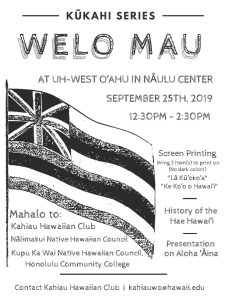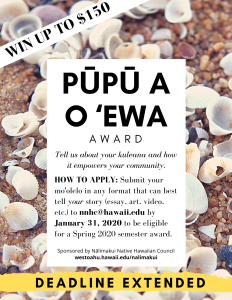Activities
The Nālimakui Council of the University of Hawaiʻi–West Oʻahu provides a formal, independent voice and organization through which the Native Hawaiian faculty, administrators, and students of the University of Hawaiʻi–West Oʻahu can participate in the development and interpretation of systemwide policy and practice as it relates to Native Hawaiian programs, activities, initiatives, and issues.
Events
An exhibit honoring kiaʻi who stand for Mauna Kea, ʻāina, wai, and the lāhui Hawaʻi featuring art and photos from Mauna Kea Education and Awareness, UHWO faculty, staff, and students, Na Kiaʻi o Wai Hā, Oʻahu Water Protectors, and Kaʻohewai.
This exhibit was at the UHWO Library from August 9 – October 31, 2024. Learn more here.
David Kawika Hall will share his experience as a cultural monitor during the Lahaina recovery process and how the traditional practice and teachings of lua have grounded and sustained him.
This event was held on April 4, 2024 from 12:30 PM – 2:00 PM. Learn more here.
Keala Kelly and Sam Ikehara will critically examine the cultural and environmental impacts of military occupation in Hawaiʻi and Okinawa, highlighting shared experiences and dynamics.
This event was held on January 16, 2024 from 6:00 PM – 8:00 PM. Learn more here.
A screening of the film, Hawaiian Soul, including behind-the-scenes footage and a Talk Story with the film’s director, ʻĀina Paikai!
This event was held on March 31, 2022 from 5:00 PM – 6:30 PM. Learn more here.
This event was held on September 25, 2019 from 12:30 PM – 2:30 PM. Learn more here.
A panel discussion, in 2019, with Lelemia Irvine, Kealani Cook, Kaliko Correa, and Tiana Henderson. View pictures here.
Statements
STATEMENT RE: THE UNIVERSITY OF HAWAIʻI PRESIDENT SEARCH
On behalf of Nālimakui Native Hawaiian Council at the University of Hawaiʻi – West Oʻahu, we encourage the University of Hawaiʻi Board of Regents and the Presidential Search Advisory Group to consider the following qualifications for our next University President:
- Working knowledge of Hawaiʻi’s history including the illegal overthrow of Ke Aupuni Mōʻī Hawaiʻi and the effects of colonialism on Native Hawaiians today
- Knowledge of ʻōlelo Hawaiʻi (at minimum, correct pronunciation and spelling of hua ʻōlelo Hawaiʻi)
- Demonstrated experience of working with Kanaka Maoli, or other Native and Indigenous communities
- Commitment to protecting and preserving the ʻāina of Hawaiʻi, minimizing any negative impact(s) of all University endeavors including campuses, research, projects, and partnerships
We would like to see the next University President take a more active role in fulfilling the Kuleana Imperative of the University of Hawaiʻi Strategic Plan, especially in regards to ensuring the success of Native Hawaiian students, faculty, and staff, and improving the lives of Native Hawaiians across the pae ʻāina o Hawaiʻi.
We also strongly recommend that the Board of Regents expedite the process of reinstating the University President and University of Hawaiʻi at Mānoa Chancellor positions back into their distinct roles. It is unfeasible for one individual to effectively meet the needs of Mānoa while ensuring fair balance to the remaining UH campuses.
This statement was created for a public forum, held on May 7, 2024 at the University of Hawaiʻi – West Oʻahu, to develop the position description and leadership profile for the next University of Hawaiʻi President.
Aloha e Luna Noho Kim a me nā Lālā o nā Komike,
We the undersigned are writing to express our opposition to the proposed changes to the tenure system found in SB3269. We are faculty and staff of Native Hawaiian descent at the University of Hawaiʻi, West Oʻahu. While we are writing as a concerned group of interested individuals rather, our experiences both as Kānaka Maoli within the University System and at UHWO have informed our opinions about the current bill. In particular it has led to concerns about some of the potential consequences of this bill on the voice of historically underserved populations in campus governance.
In particular we wished to point out that many of the faculty of Native Hawaiian or Filipino descent at UHWO are in specialist positions. As Specialist Faculty they are allowed a place in the Faculty Senate and thus an established role in the shared governance of the university. Ending the Specialist Faculty classification would have a direct negative impact on the voice of Native Hawaiians and Filipinos in that shared governance. Our student body, it should be noted, is currently 28% of Native Hawaiian descent and 23% of Filipino descent. As of the data from Fall 2020, Instructional Faculty were just under 12% and 5% respectively, and a Faculty Senate pulled just from those ranks would be even less able to represent the concerns of those communities.
In addition to reducing the raw numbers of faculty of Native Hawaiian and Filipino descent, ending the Specialist Faculty classification would weaken the ability of the Senate and its associated committees and working groups to connect to the specific and special needs associated with historically underserved populations. The specific roles that Specialist Faculty fill give them crucial insights into these needs in ways that could be easily overlooked by Instructional Faculty due to the differing nature of their work. Advisors and the faculty of the Noʻeau Tutoring Center, for instance, work with students on a one-on-one level in ways that allow them to understand student needs and to push the campus to meet those needs. In ending the classification, we risk not only silencing their voices in campus governance but those of the students that they work closely with and advocate for.
Finally, these times demand an ability to foster spaces of aloha. The foundation of aloha is a reciprocal relationship of respect and trust. We have found this to be a key component in our work with students, each other and our community at large. We understand that the committees are weighing a number of factors in this hearing, but we trust that the Senate will take the time to examine these issues with an understanding of some of these consequences and we hope that you will vote against allowing this bill to move forward.
Signed,
Kealani Cook, Associate Professor, Humanities Division
Kamuela Yong, Associate Professor, Mathematics, Natural and Health Sciences Division
Lelemia Irvine, Assistant Professor, Mathematics, Natural and Health Sciences Division
Carrie Larger, Specialist Faculty, Student Affairs Division
Kawena Komeiji, Librarian, UHWO Library
Kēhau Kahanu, Program Specialist, Chancellor’s Office
Kaʻiulani Akamine, Specialist Faculty, Student Affairs Division
Carina Chernisky, Librarian, UHWO Library
Keʻalohi Perry, Faculty Specialist, Division of Student Affairs
Nicole Kau’i Merritt, Assistant Professor, Mathematics, Natural and Health Sciences Division
Michiko Joseph, Librarian, UHWO Library
Kalikolani Correa, Assistant Professor, Humanities Division
Aloha e Nā Regents of the University of Hawaiʻi System,
We are writing in opposition to the proposed changes to the tenure system detailed in the Report of the Permitted Interaction Group on Tenure dated September 10, 2021. As the Native Hawaiian Council at the University of Hawaiʻi-West Oʻahu, we are deeply concerned about both the process and the proposed changes. The lack of any meaningful discussion with the faculty senates of the different campuses, with UHPA, or with the university community at large is eroding the foundation of shared governance both within our Universities and within academia as a whole. We echo Director Fern’s concerns that these changes seem to be emerging to meet political interests rather than educational ones.
In addition, it is important to note that a considerable percentage of the faculty on our campus impacted by the proposed changes to the Faculty Classification System are Native Hawaiians and from other groups underrepresented among the faculty as a whole. These changes would have a clear negative impact both on the voice of those groups within bodies such as the faculty senates across the system and their status and standing on their various campuses. This would ultimately weaken our ability to affect necessary responsive pivots to students’ ever changing needs.
These times demand an ability to foster spaces of aloha. The foundation of aloha is a reciprocal relationship of respect and trust. We have found this to be a key component in our work with students, each other and our community at large. We request that the Board of Regents table these changes in order to allow a more meaningful conversation with the affected faculty senates, the Püko’a Council, UHPA, and the university community at large in order to restore trust in the Board with regards to this process.
Sincerely,
Chairperson Kealani Cook
On behalf of the Nālimakui Council
University of Hawaiʻi-West Oʻahu
PROCLAMATION FOR THE SAFETY OF EVERYONE ON MAUNA KEA
Whereas, The purpose of Nālimakui Native Hawaiian Council is to provide a voice and organization through which the Native Hawaiian faculty, staff, students, and administrators of the University of Hawaiʻi – West Oʻahu can participate in the development of an indigenous serving institution, including the interpretation of campus policy and practice as it relates to Native Hawaiian programs, activities, initiatives, and issues.
Whereas, The Native people of Hawaiʻi are unique by virtue of their ancestral ties to the ʻāina, their mo’olelo, history, language, culture, knowledge, and spirituality. The Nālimakui Council, envisions a University of Hawaiʻi – West Oʻahu committed to the development of a pono Hawaiʻi, including but not limited to the empowerment, advancement, and self-determination of Kānaka Maoli, through distinctly Hawaiian instruction, research, and service.
Whereas, The University of Hawaiʻi has declared itself committed to becoming a model indigenous-serving institution.
Whereas, The Nālimakui Council believes that in order for the University of Hawaiʻi to meet this goal, its leadership must honor and respect the indigenous culture and people of the land on which it resides.
Whereas, The Nālimakui Council believes the University of Hawaiʻi has a duty to prioritize the safe and ethical treatment of students, staff, faculty, and community members above the interests of the university’s other stakeholders.
Whereas, police on Maui Island have in the past used excessive physical force on peaceful kiaʻi seeking to stop a University of Hawaiʻi affiliated project on Haleakalā.
Whereas, the failure of University of Hawaiʻi leadership to speak forcefully against potential uses of excessive force has contributed to a widespread atmosphere of suspicion and distrust.
Whereas, in their efforts to protect Maunakea the Kia’i have developed, promoted, and acted under Kapu Aloha, a commitment to non-violence and to aloha as a guiding principle to action and thought.
Therefore, in regards to the Kiaʻi protectors of Mauna Kea, we invite and urge the university leadership to stand with us in promoting the principles of kapu aloha in all actions on the mountain including those carried out by the State and County in support of the TMT.
The Nālimakui Native Hawaiian Council of the University of Hawaiʻi – West Oʻahu condemns any violations or incitements of violence as violations of Kapu Aloha and invite and urge the University to join us in condemning any and all physical or psychological abuse against the protectors including but not limited to:
- The use of excessive force, including the use of batons, pepper spray or other chemical agents, or choke holds.
- The use of Long Range Acoustic Devices (LRADs) as a weapon.
- Any arrests not processed using established procedures and norms under Hawaiʻi law.
- Any and all efforts to incite violence, such as the actions of heavily armed and armored officers who cut the Hawaiian flag during the police action on Friday, September 6, 2019.
Furthermore, the Council calls for the University to request a halt to all police action on Maunakea until legitimate negotiations between the Kia’i leadership and government leaders have taken place.
This proclamation is released with full support of the Nālimakui Native Hawaiian Council on this 17th day of September 2019.
Student Awards
The Nālimakui Native Hawaiian Council has some money to cover conference registration fees for Students, Staff, and/or Faculty. One of the goals of the Nālimakui Council is to build capacity among Native Hawaiians. As a result, applications will be prioritized by Students > Staff > Faculty. Preference will be given to Native Hawaiians.
The conference must occur and conclude no later than May 31, 2020. The application period was Spring 2019.








